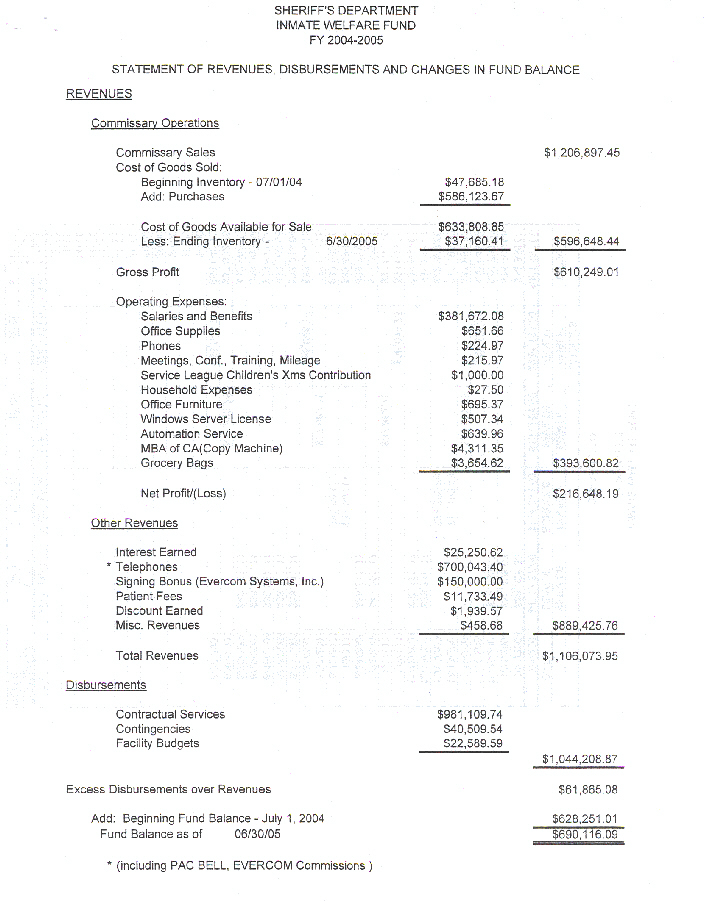Revenue and Fund Balance
The department generates revenues from two main sources. These are from Inmate Commissary sales and Inmate Telephone Commission. Evercom Systems, Inc currently provides the inmate telephone service, under a contract through October 30, 2007. Upon expiration of this extension, County will issue an RFP seeking responses from interested vendors seeking opportunity to provide this service.
In the Spring of 2004, Evercom introduced pre-paid calling cards to the inmates. The use of pre-paid calling cards increased during this reporting fiscal year. The cost is a flat $0.50 per minute. There is no connectivity fee associated with the card, which had been a previous concern of the inmate’s families, who pay the cost of collect calls. The use of pre-paid calling cards helps the inmates to plan and budget their calls knowing how much money they have to spend towards telephone calls. Pre-paid calling cards also allow inmates to make calls to telephones that previously were not possible, such as to cell phones and to some international numbers (such as Mexico and the Central Americas.) This helps inmates keep in touch with their families locally and long-distance.
The other major revenue generation is from commissary sales to the inmates. Consistent with state law and regulations, the inmate commissary is operated for the purpose of providing various personal items, authorized non-prescription medicines in limited dosages, and foodstuffs to the inmates. All medication dispensed through the commissary is first approved by the medical unit staff. The County dietitian and the facility Commanders or their designees also review other foodstuffs, before being offered for sale to the inmates. The commissary is operated from an automated computer system which maintains individual inmates account balances and keeps a running balance and transaction history of all transactions for the inmate.
The commissary employs five full time staff, and they provide commissary service at least twice a week to approximately 1200 inmates. The Sheriff's Fiscal Unit also provides fiscal and administrative support for this operation. The total commissary sales for year 2004-2005 were $1,206,897 with a net profit of $216,648 or 17.95% of gross sales.
Fund Balance
We are pleased to inform the Board that for FY2004/2005, the net income for the Inmate Welfare Trust Fund was $1,106,073. The sources to this revenue were: Inmate Telephone Commissions ($700,043); Commissary sales ($216,648); interest earned on fund balance ($25,250); contract extension fee from Evercom, Inc. for renewal of contract for additional 3 years ($150,000); and miscellaneous revenue, including patient fees revenue and discounts earned ($14,132). The closing fund balance as of June 30, 2005 was $690,116.
Disbursements: Rehabilitation, Education and Recreation
The total disbursement for the year was $1,044,208. Contracted services for inmates accounted for $981,109 of this cost, and other various disbursements came to $63,099.
The Inmate Welfare Trust Fund contracts with the Mental Health and Public Health Divisions of San Mateo County Health Services to provide a chemical dependency recovery and substance abuse program (CHOICES), as well as a Mental Health inmate counseling program. These services are available to all inmates in County Correctional Facilities. The Fund also contracts with the County Superintendent of Schools for operation of a GED certificate program for the inmates. A library is also maintained in the facility for the inmates. This is contracted with the Service League, which also provides a variety of in-custody support and post-release services for inmates.
The Fund also pays for the purchase of some items that are used for and by the inmates for recreation and self-development, such as televisions and stand-alone computers, which are placed in the day rooms and housing units throughout the Sheriff's Correctional Facilities, or used in conjunction with other special programs, such as the computer training component of the Bridges Program.
Administrative & Fiscal Impact.
A committee consisting of the Assistant Sheriff, the Captain of the Sheriff’s Detention Division and a Community Representative oversees the Inmate Welfare Trust Fund operation. The committee approves yearly fund requests from the service providers and the facilities. The committee also makes recommendations for award of contracts, most of which (because of the dollar amount) come before the Board of Supervisors for approval. The personnel budget for the inmate commissary positions is contained within the Sheriff's annual budget, and is fully offset by commissary fund transfers.
The fund is audited annually by the County Controllers Office auditors.
There is no Net County Cost to the County's General Fund for the operation of the Inmate Welfare Fund Trust.
| 